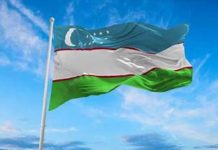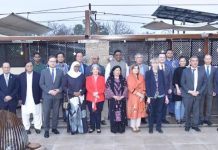ISLAMABAD, DEC 22 /DNA/ – In an age where regional integration hinges on effective connectivity, Pakistan’s strategic geographical position offers a vital gateway to landlocked Central Asian states, a cost-effective and strategically advantageous trading partner for Pakistan. Realizing the trade potential between these regions, however, requires overcoming policy, technical, and regional challenges through collaboration and visionary strategies.
This was the central theme at the launch event for Bridging Horizons: Unraveling the Enigma of Connectivity between Pakistan and Central Asia, a book authored by Dr Faisal Javaid, Dr Uzma Siraj, and Prof Dr Arkadiusz Żukowski. Published by IPS Press – the publishing arm of the Institute of Policy Studies (IPS), Islamabad, the book explores the historical, economic, and policy-driven dimensions of Pakistan-Central Asia relations, offering actionable insights into challenges and opportunities for fostering stronger ties.
The launch ceremony, hosted at Federal Urdu University of Arts, Science and Technology (FUUAST), Islamabad, was addressed as chief guest by Ambassador (r) Riaz Hussain Bukhari, Pakistan’s former envoy to Uzbekistan, Prof Dr Ijaz Shafi Gilani, chairman Gallup Pakistan, Khalid Rahman, chairman IPS, Ambassador (r) Syed Abrar Hussain, vice chairman IPS, Dr Ihtsham Ul Haq, associate professor, FUUAST, Islamabad, and Dr Uzma Siraj, head IR Department, FUUAST. The event attracted an audience of scholars, diplomats, policymakers, and students, reflecting the growing interest in Pakistan-Central Asia relations.
The speakers highlighted the critical role of regional trade, the enduring cultural and historical bonds, and Pakistan’s strategic location as a potential linchpin for multidimensional connectivity.
Emphasizing the book’s central thesis, Dr Uzma Siraj underscored that connectivity is the cornerstone of regional integration, where Pakistan’s strategic location connects landlocked Central Asian states to global markets. She noted that while the trade potential between Pakistan and Central Asian countries is immense, achieving this requires overcoming a multitude of challenges. In this context, she added that the book presents actionable strategies to enhance connectivity, including exploring alternative routes.
In addition to exploring routes, it is important to ensure policy implementation and translate agreements into actions, Ambassador Riaz Hussain noted. It becomes urgent as Pakistan has signed over 255 bilateral and multilateral MoUs, protocols, and agreements with Central Asian countries since 1991. He projected that bilateral trade could grow to $4 billion with robust policies and investments.
Adding to the economic dimension, Dr Ihtsham Ul Haq delved into the trade potential between Pakistan and Central Asia. Citing the Gravity Model of International Trade, he explained how Central Asia represents a cost-effective and strategically advantageous trading partner for Pakistan.
Dr Ijaz Gilani reflected on the historical significance of land and sea routes, which have been instrumental in shaping empires and global trade dynamics over centuries. He observed that in the evolving world order, these routes are being revived for regional trade and connectivity, particularly under China’s Belt and Road Initiative.
Endorsing this, Ambassador Abrar Hussain pointed out that the book provides insights to recognize mutual opportunities and build upon the historical connections, as Central Asia and Pakistan have multidimensional historical, cultural, and trade ties dating back to the Indus Valley civilization. He highlighted Pakistan’s efforts following the disintegration of the USSR to strengthen these ties, referencing initiatives such as TAPI, CASA-1000, and the Trans-Afghan Railway.
In his concluding remarks, Khalid Rahman elaborated on Pakistan’s unique geographical position at the crossroads of South, Central, and West Asia. He argued that this strategic advantage provides Pakistan an unparalleled opportunity to become a hub of regional connectivity. However, realizing this potential requires not just visionary strategies but also consistent policy implementation and proactive regional collaboration. He reiterated that comprehensive integration strategies and foresight are essential to achieve meaningful regional connectivity and national benefit.

















